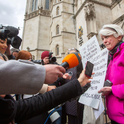The government of the United Kingdom does not say that it wants to kill people, but it does want to be as free as possible from any legal consequences when its agents cause death. Statute by statute, the trend is for the British state to remove any relevant criminal or civil liability from those who make life or death decisions in its name.
Take foreign operatives. The Intelligence Services Act provides the power for ministers to authorise criminal acts abroad, including the most serious crimes such as murder. Under the wonderfully numbered “section 007” of the Act (well, section 7), an authorised person will not have any liability in the British courts for unlawful actions abroad. This does not make the operative immune from liability in the foreign jurisdictions where the criminal offence and civil wrongs take place—the Westminster parliament cannot legislate for other countries. So the Act’s authorisation is not an absolute licence to kill—but it is the most legal protection that the British state can bestow. And we will never be told if these powers are abused.
That Act dates from 1994, but this effective legal immunity has recently been extended to covert agents working in the UK. The Covert Human Intelligence Sources (Criminal Conduct) Act 2021 means domestic agents of the state can be authorised to commit crimes—including unlawful killing—and break civil obligations. During the bill’s passage, the government resisted attempts to exclude the gravest offences. It assured parliamentarians that authorisations would only be used “reasonably”—though, of course, the lack of transparency of the British state means few would ever know otherwise. Parliament nodded along with these assurances, and another licence to kill was passed into law.
Even before this legislation, there was always a cosy relationship between the security state and the prosecution service, where if there was no doubt that a crime had been committed, the prosecution service could (and invariably did) decide there was no public interest in that particular prosecution.
Around the same time as the domestic covert intelligence legislation came the government’s attempt to make it effectively impossible to prosecute former service personnel for war crimes, including against civilians. This was too much even for British parliamentarians, and so the exception for war crimes was removed.
All these authorisations and exemptions come in the context of a British political-media culture that makes it extraordinarily difficult to hold the state accountable for the deaths of others, even without such legalistic privileges. The government hardly needs formal protections at all.
Until the conviction of a police officer for the manslaughter of former Aston Villa footballer Dalian Atkinson—and it was telling that it was only when the victim was a celebrity that a conviction was obtained—there had not been a successful prosecution of an officer over any death in custody or after police contact for more than 35 years. Nobody responsible for the deaths at Hillsborough was convicted of an offence. The police officers responsible for the unlawful killings of blameless Brazilian Jean Charles de Menezes (shot on the London Underground in an anti-terror operation in 2005) and newspaper vendor Ian Tomlinson (struck before collapsing at protests around the G20 in 2009) both walked free. And for all the documented war crimes by our forces in Afghanistan and Iraq, there has only been one conviction: and that was of a corporal, and not of any commanding officer.
Investigations and prosecutions are more often relayed to the public through a particular media narrative. State agents are “dragged through the courts” and “hounded” in “witch hunts.” The lawyers who pursue these cases are “ambulance chasers.” The police should be “free from worry” about the prospect of prosecution. The tabloids invariably present the officials and soldiers as the real victims, rather than the persons killed or tortured. With this style of reporting in a state of this sort, it is a wonder prosecutions ever happen at all.
This is the grim background to the latest proposal for effective state immunity. The home secretary, Priti Patel, wants Border Force agents to have legal protection in their dealings with refugees crossing the English Channel. There is to be no legal liability for these officials when their fatal decisions are “reasonably” taken in “good faith.” In other words they will be legally safe, despite the deaths they cause, when they are “only doing their jobs.”
Ministers do not believe the practical immunity afforded by our political-media culture is enough. The nods and winks to the prosecution service do not provide sufficient cover. Ministers want there to be a formalisation of official protection. Not only must injustice be done, but injustice must be seen to be done, with full legal protection.
If the legislative trend continues, any agent of the state who makes life or death decisions will not face legal liability. There are always calls for police to be safe from prosecution when they kill people. And one day we will end up in a situation where, even if the state becomes reckless about the lives of its citizens, there will be no legal incentive for it to behave otherwise. The UK state may not want its officials and operatives to kill people, but soon there may be no legal consequences if they do.













